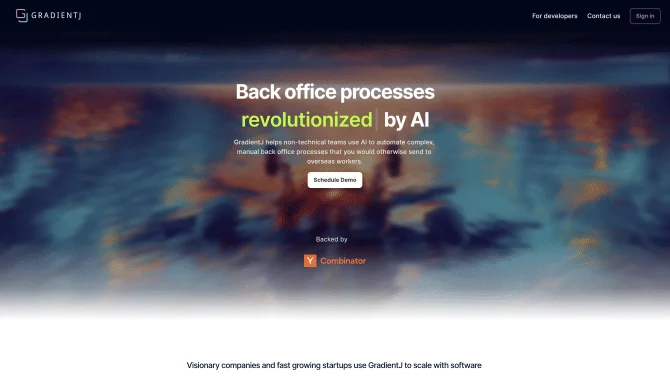Introduction
GradientJ is a comprehensive platform that streamlines the development process of NLP applications by leveraging the capabilities of Large Language Models (LLMs). It provides an intuitive app-building canvas, allowing developers to quickly prototype, test, and deploy sophisticated applications. With GradientJ, users can engage in collaborative efforts to manage and configure applications tailored to multiple customers' needs. The platform's focus on prompt optimization, data integration, and complex application orchestration makes it a powerful tool for enhancing model performance and accuracy.
background
GradientJ is part of a growing ecosystem of AI tools designed to simplify the complexities of developing and managing NLP applications. It was developed to meet the demands of a market where the ability to quickly adapt and deploy AI solutions is crucial for staying competitive. The platform's development reflects a deep understanding of the needs of developers, data scientists, business owners, and researchers in the field of NLP.
Features of GradientJ - Build NLP Fast
AI Learning
GradientJ's AI learns alongside the user, adapting and improving the application over time.
Complex App Building
The platform provides an easy-to-use canvas for constructing intricate applications swiftly.
Team Collaboration
Post-deployment, GradientJ facilitates team collaboration for application management and configuration across various customers.
Prompt Optimization
Users can test, fine-tune, and experiment with prompts to achieve optimal model performance.
Data Integration
Proprietary data can be integrated to boost the model's accuracy and relevance.
Orchestration
Complex APIs can be created by chaining prompts and knowledge bases with one-click deployment monitoring.
Live Feedback
NLP models can be continuously refined through live user feedback and A/B testing of prompts.
Benchmarking
Save and compare different prompt versions to identify the most effective ones.
How to use GradientJ - Build NLP Fast?
To use GradientJ, start by signing up on the website and creating a new project. Upload your training data or use datasets provided by GradientJ. Define your application's objectives and configure the parameters. Train the language model with available resources, then deploy your NLP application for use.
Innovative Features of GradientJ - Build NLP Fast
GradientJ stands out with its ability to quickly build complex applications, its collaborative post-deployment features, and its comprehensive suite for fine-tuning and managing NLP applications, all while ensuring models are accessible and continuously improved based on user insights.
FAQ about GradientJ - Build NLP Fast
- How do I create a new project on GradientJ?
- Sign up on the GradientJ website and follow the prompts to create a new project.
- Can I use my own training data on GradientJ?
- Yes, you can upload custom training data or utilize pre-existing datasets provided by GradientJ.
- What kind of language models can I use on GradientJ?
- You can use large language models like GPT-4 for your NLP applications.
- What use cases are suitable for GradientJ?
- GradientJ is suitable for chatbot development, sentiment analysis, language translation, and more.
- How can I contact GradientJ support?
- You can reach out to customer service via the support email oscar@gradientj.com.
- Where can I sign up for GradientJ?
- The sign-up link for GradientJ is https://www.gradientj.com/onboard.
- Is there a free trial or demo available for GradientJ?
- Please visit the GradientJ website for information on trials or demos.
Usage Scenarios of GradientJ - Build NLP Fast
Chatbot Development
GradientJ can be used to build intelligent chatbots that understand and respond to user queries.
Sentiment Analysis
Analyze customer feedback and social media posts to gauge public sentiment towards a product or service.
Language Translation
Develop applications that can translate text between multiple languages efficiently.
Text Summarization
Create summaries of large documents or articles for quick consumption of information.
Named Entity Recognition
Identify and classify key information in text, such as names, organizations, and locations.
User Feedback
Users have reported that GradientJ significantly streamlines the process of building and managing NLP applications, allowing for rapid iteration and deployment.
The team collaboration feature has been praised for its efficiency in managing applications across different clients, enhancing teamwork and productivity.
Feedback highlights the ease with which proprietary data can be integrated, improving the accuracy and relevance of the models.
Users appreciate the ability to experiment with prompts and optimize them for better model performance, citing it as a key strength of the platform.
others
GradientJ's platform stands out in the AI development landscape for its user-centric approach, providing a robust set of tools that cater to a wide range of NLP needs. Its focus on continuous improvement and the incorporation of user insights ensure that the applications developed are not only efficient but also highly relevant and adaptable to user requirements.
Useful Links
Below are the product-related links, I hope they are helpful to you.
